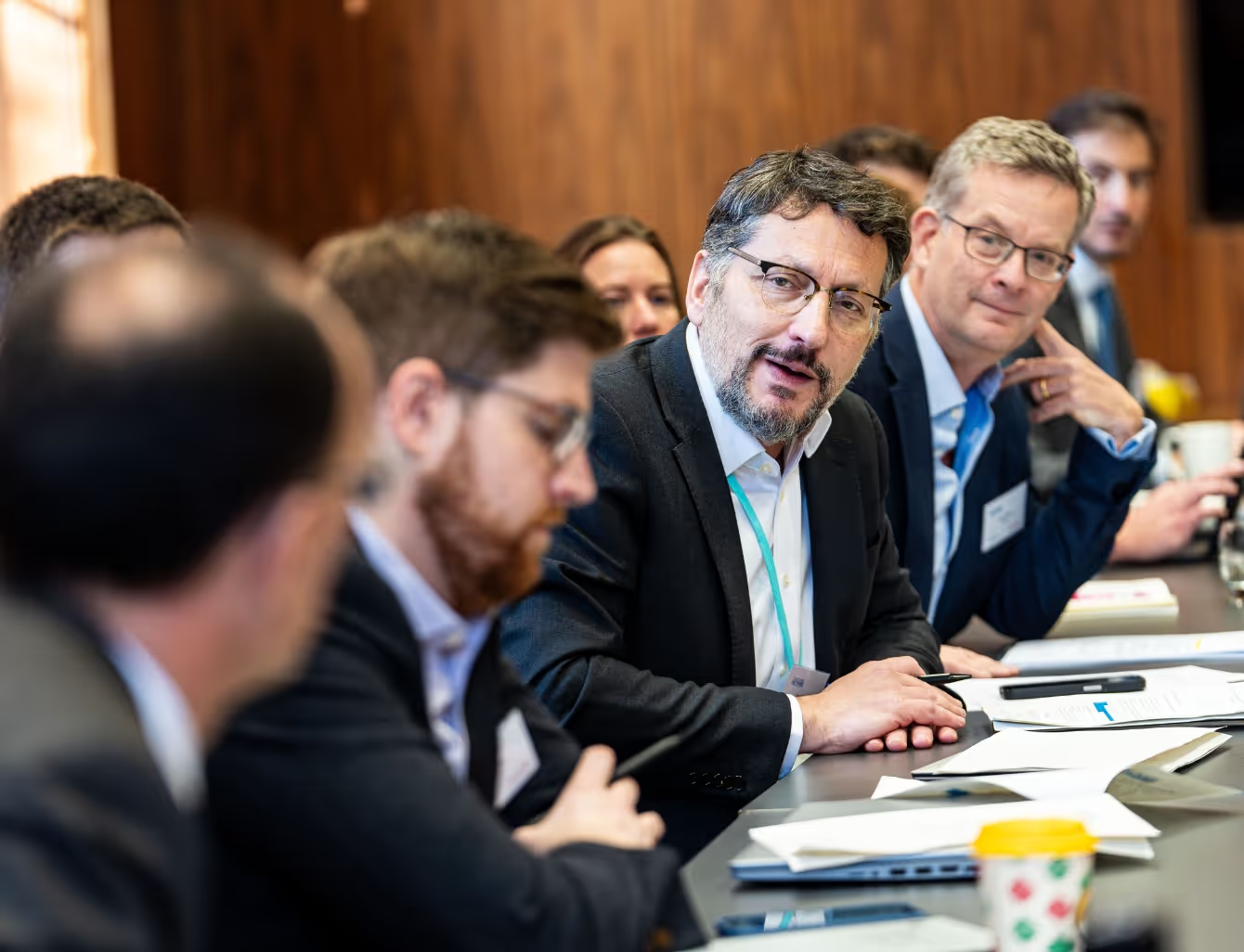
To achieve clean power by 2030, the UK must connect an additional 120 GW of renewable generation and storage capacity to the grid. Ensuring projects can connect quickly and easily, alongside a proactive approach to grid capacity planning, is critical.
Regen was one of the first organisations to flag the severe delays facing projects in getting a connection and to highlight the urgent need for grid upgrades at both the transmission and distribution levels. We have worked closely with the government, regulators, operators and developers to ensure that industry views are heard and that we continue to have the dynamic development pipeline needed for Clean Power 2030.
Our CEO, Merlin Hyman, chairs NESO's Connections Process Advisory Group and sits on Ofgem's Connections Delivery Board, steering the design of NESO’s connections methodologies proposals under TMO4+. We are engaging with DESNZ, Ofgem and NESO on these reforms, based on input from members at our grid connections working group, which provides a platform for members – whether developers or wider stakeholders – to collaborate, engage directly with network operators and influence the future of grid infrastructure.
Regen convened a special working group inviting member views on ‘red flags’ in the final connections reform proposals, focusing on the impact of connections reform on projects that have already received significant investment and could contribute to Clean Power 2030. The meeting aimed to gather consensus on key areas to raise with Ofgem, the Energy Networks Association (ENA) and DNOs, pressing for further clarity.
Following Regen’s open letter in December 2024 calling for the Transmission Impact Assessment threshold to be raised from 1 MW to 5 MW, to exempt ‘local’ projects and reduce barriers to onsite generation at commercial and industrial sites, NESO has raised an urgent code modification to increase the threshold in England and Wales. We have continued engaging on new G99 requirements and ENA confirmed that an Allowable Changes document with more detail is forthcoming.
In December 2024, NESO sent its final connections reform recommendations to Ofgem. We expect a ‘minded to’ position from Ofgem in February, with a final decision at the end of March. Gate 2 for the entire queue is still expected to take place in May 2025, with NESO informing developers ‘during the summer’ whether they are at Gate 2 and in which phase. NESO’s aim remains to issue updated offers by the end of 2025.


The energy market must evolve to deliver a net zero energy system. The UK government’s Review of Electricity Market Arrangements (REMA) has stimulated a vigorous debate around whether or not the GB electricity market is fundamentally ‘broken’.
The energy market must evolve to deliver a net zero energy system. The UK government’s Review of Electricity Market Arrangements (REMA) has stimulated a vigorous debate around whether or not the GB electricity market is fundamentally ‘broken’. Our view – and that of our members and the majority of industry stakeholders – is that it is not. However, while we would oppose the more radical market reform options, which would significantly hinder private-sector investment in renewables, we do believe a program of reform is required.
In response to the government’s consultations on REMA, we brought together developers, policymakers and stakeholders with an aim to shape a market that works for clean power, encourages investment, drives innovation and keeps costs fair for consumers.
Regen has advocated for changes that better align market incentives with the needs of a decarbonised grid, including mechanisms to reward flexibility, enable local energy solutions and integrate storage effectively. Our director, Johnny Gowdy, sits on REMA advisory board.
Following an update in December 2024, the government's REMA team is continuing work to consider a zonal market design, grandfathering arrangements and whether there is a sufficient business case to embark on such a radical market reform. The REMA team has said it is still undecided between zonal and national market designs, but that a decision will be made before the CfD Allocation Round 7 in the summer.
Regen’s view remains that a shift to zonal pricing would not bring the theoretical benefits that have been claimed and would be high risk given the need to secure investment and accelerate deployment of generation, storage and network capacity. It is also a distraction from the Clean Power Plan and imperative to reduce consumer bills. Instead, reform should be focused on our current market structures to deliver further benefits to consumers, without the investment risk and unintended consequences of zonal market separation. Regen is continuing to engage with the REMA team over the coming months, supported by the views and input of our members.


The volume of planning applications for renewable energy projects of all scales in England has more than trebled in the last decade and must yet rise significantly if we are to meet our net zero targets. However, the planning system is not fit for purpose, which is creating delays that impact the deployment of essential renewable energy and storage projects.
The volume of planning applications for renewable energy projects of all scales in England has more than trebled in the last decade and must yet rise significantly if we are to meet our net zero targets. However,the planning system is not fit for purpose, which is creating delays that impact the deployment of essential renewable energy and storage projects.
Regen has long promoted the positive role that planning can have in achieving a smart energy future.
Our planning working group provides an opportunity to discuss issues faced in the planning process and how we can shape work on planning reform. In light of the positive steps taken by the UK government, including removing the planning restrictions on onshore wind in England and updating the National Planning Policy Framework, the input from our members is more crucial than ever before to ensure that opportunities to accelerate the deployment of renewable energy and storage projects are not missed. This includes aligning planning policies and planning decisions with the 2050 net zero carbon target, providing further weight to low-carbon infrastructure in the planning process and introducing specialist renewable energy planners to work across local authorities.
In January 2024, Regen’s planning and communities lead, Rebecca Windemer, gave evidence to the Environmental Audit Committee on enabling the sustainable electrification of the economy. Our recommendations were reflected in the House of Commons Environmental Audit Committee’s report on the findings of the inquiry. Rebecca also sits on the government’s Onshore Wind Industry Task Force.
We are also focusing on combatting misinformation and upskilling political stakeholders on the complexities of the planning system, through our guide to onshore renewables developed with the All-Party Parliamentary Group on Renewable and Sustainable Energy, and our recent project with the Royal Town Planning Institute, investigating the links between energy planning and local spatial planning to understand how they could be better integrated.
We’re working with our members on a response to the Ministry of Housing, Communities and Local Government’s working paper on reforming the process for consenting Nationally Significant Infrastructure Projects, our response to the Welsh government consultation on promoting a resilient and high-performing planning service and on informing NESO’s draft methodology for the Strategic Spatial Energy Plan.

.avif)
Bringing people along on the transition to a clean power system is crucial for the delivery of our essential net zero targets. This includes not just engaging with individuals and communities, but understanding how to maximise the value of a clean energy system, particularly for those most at-risk of being left behind.
Bringing people along on the transition to a clean power system is crucial for the delivery of our essential net zero targets. This includes not just engaging with individuals and communities, but understanding how to maximise the value of a clean energy system, particularly for those most at-risk of being left behind.
We face a pivotal moment to reshape how people and communities participate in and benefit from the energy transition. Net zero will require huge changes in how people heat their homes, travel, work and interact with the energy system. This means meaningful engagement to ensure that the transition reflects the needs of people and places everywhere, and that everyone can benefit in the process. Regen advocates for passing the value of net zero back to consumers, through the full spectrum of benefits, from lower energy bills, increased energy security and better jobs.
And for the energy industry itself, we cannot hope to assemble a more inclusive one, capable of undertaking the challenge ahead, without more people from underrepresented backgrounds at the table.
In 2014, Regen produced two sets of best practice guidance for onshore wind developments: on community engagement and community benefits. Working alongside our members as part of our planning working group, we are now developing a best practice engagement guide to cover a broader range of technologies needed for net zero. Our paper ‘Sharing Power: unlocking shared ownership for a fast and fair transition’ funded by the William Grant Foundation, provides a comprehensive framework for how shared ownership can support a just energy transition, offering detailed actions for the UK government and GB Energy to harness its potential for people, planet and the UK’s net zero mission.
Regen’s just transition lead, Fraser Stewart, sits on the Scottish Government’s Fuel Poverty Advisory Panel and is research manager for Consumer Scotland, steering and scrutinising devolved policy to tackle fuel poverty in Scotland. We are actively calling for clearer guidance for developers and local authorities on community engagement, coupled with public campaigns to dispel misinformation and engage meaningfully and constructively about net zero infrastructure. We called on the new government to develop and commit to a Fair Net Zero Framework within the first year of parliament and commit resource to unlocking shared ownership and community benefits for clean power projects. We await further detail on the government’s plan to deliver a just transition.
